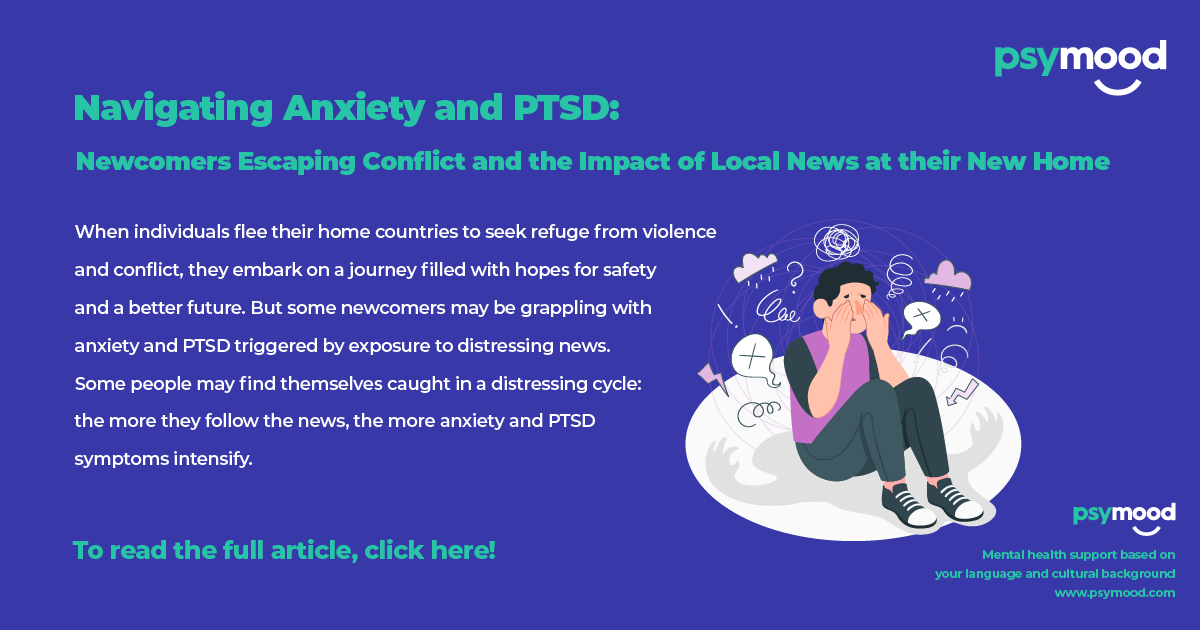Navigating Anxiety and PTSD: Newcomers Escaping Conflict and the Impact of Local News at their New Home
When individuals flee their home countries to seek refuge from violence and conflict, they embark on a journey filled with hopes for safety and a better future. However, the trauma they experienced did not go away upon arrival in a new location. Some newcomers may be grappling with anxiety and post-traumatic stress disorder (PTSD) triggered by exposure to distressing news. In this article, we’ll explore how reading local news can affect the mental health of newcomers and provide some tips on coping with anxiety in a new environment.
Newcomers escaping violence have already endured harrowing experiences that have left lingering scars on their mental and emotional well-being. The trauma they carry with them can manifest as anxiety, hypervigilance, nightmares, and intrusive thoughts, making it difficult for them to find solace even in a safer environment. Other initial reactions to trauma can include exhaustion, confusion, sadness, anxiety, agitation, numbness, dissociation, confusion, physical arousal, and blunted affect. (National Library of Medicine)
When a newcomer is exposed to local news, the information can be a double-edged sword. Staying informed about one’s surroundings can create a sense of connection and help one stay engaged with ongoing events, which is ideal. On the other hand, consuming news about violence, conflict, or political instability can trigger a cascade of anxiety and retraumatization, exacerbating PTSD symptoms.
Some people may find themselves caught in a distressing cycle: the more they follow the news, the more anxiety and PTSD symptoms intensify. The constant exposure to upsetting stories, images, and discussions can flood their minds with memories, fears, and a sense of helplessness. As a result, they may experience increased stress, difficulty sleeping, and difficulties integrating into their new community.
Strategies for Managing’ News’ Anxiety
Here are some strategies to manage news anxiety:
- Establish Boundaries: Set limits on news consumption to prevent overwhelming exposure. Creating designated times and time limits, for instance, setting aside 15 minutes in the evening, can help newcomers maintain control over their emotional well-being. To reduce burn-out: 5 Ways to Reduce Burnout
- Seek Reliable Sources: Encourage newcomers to rely on credible news outlets that provide balanced and accurate information. Including information on social media channels, make sure the post is from a credible outlet. This can reduce sensationalism and the likelihood of triggering anxiety. For a list of credible news outlets: newsprint or digital.
- Encourage in Self-Care: Prioritize self-care activities such as physical exercise and meditation, and spend time with supportive friends, community, or family members. For more tips on self-care: 5 Ways to Love Yourself with Self-Care
- Access local resources for funding to shelter, employment services, and community support. Resources you can find as a Newcomer or Refugee to Canada
- Book an Appointment with a Mental Health Specialist: Encourage newcomers to seek professional help from therapists, counsellors, or support groups specializing in trauma and PTSD. Therapy can provide the necessary tools and support for managing anxiety and facilitating healing. Breaking Down Barriers: The Struggle for Newcomers to Access Mental Health Services in Canada
Newcomers who have fled violence and conflict in their home countries sometimes bring over the baggage of anxiety. The impact of news consumption on their mental health cannot be overlooked, as exposure to distressing stories can trigger anxiety and re-traumatization. By adopting strategies and seeking support from mental health resources, newcomers can gradually regain control over their lives and navigate their new environment with greater resilience. As a society, we must extend our support and empathy to these individuals, ensuring they receive the necessary care and understanding during their healing process. PsyMood is here for you.
PsyMood also has Enterprise solutions for small, medium and large companies. For more information, email us at partnerships@psymood.com.
PsyMood is a digital tool designed to help you find the support you need in the language that you are most comfortable with. PsyMood considers cultural background, geographical location, interests, and personal needs, amongst other factors, to pair you with service providers for either online or in-person therapy sessions.


.png)
.png)
.png)
Recent Comments